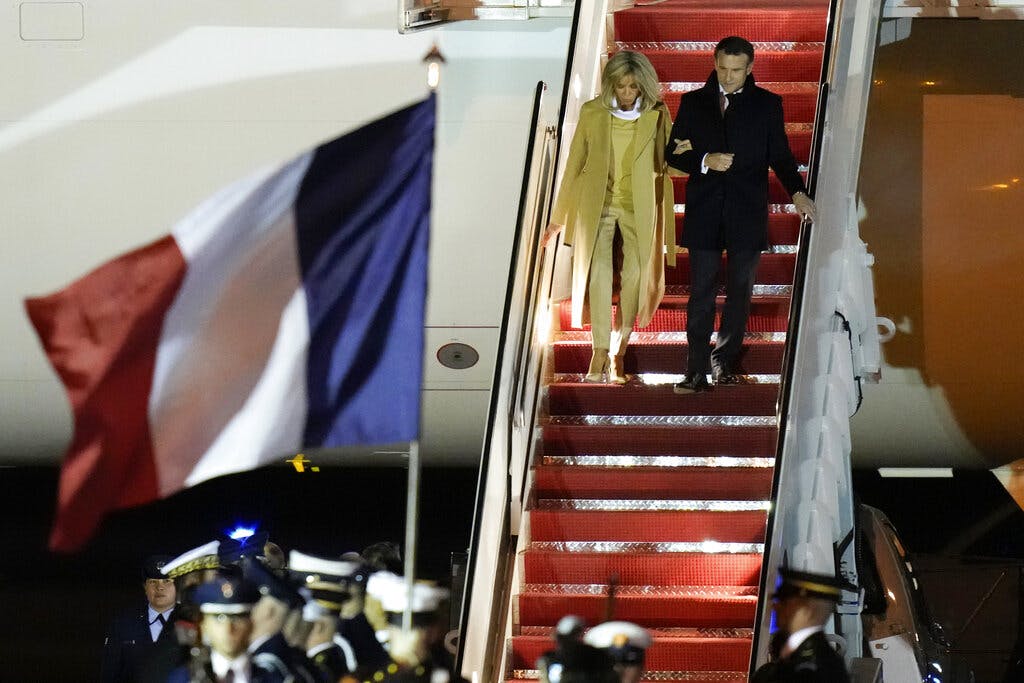Window of Opportunity
President Macron’s second state visit to America, marking a first for a French leader, will feature ceremony along with business negotiations.

Vincent Auriol, in 1951, was the first French president to visit the White House in an official capacity, at Harry Truman’s invitation. However, two previous French national leaders had lived unofficially in the United States, before assuming power.
Louis-Philippe of Orleans, who was become the French king in 1830, stayed for several months in America in 1796, as a political proscript; and Georges Clémenceau, who was to be a formidable head of government during World War I and the ensuing 1919 peace conference in Versailles, lived in the United States as a young immigrant from 1865 to 1869. He even married an American.
Auriol (who came by boat) was followed by General Charles de Gaulle in 1960 (the first one to come by plane), Georges Pompidou in 1970, Valéry Giscard d’Estaing (who traveled by Concorde — a three hours supersonic flight) in 1976, François Mitterrand in 1984, Jacques Chirac in 1996, Nicolas Sarkozy in 2007, and François Hollande in 2014.
As for Emmanuel Macron, the current president, he is the first one to pay a second state visit. He came for the first time in 2018, during his first term, as President Trump’s guest (the two men planted a tree together in the White House’s gardens, to celebrate the age-old friendship between their nations).
Having been reelected seven months ago, he is back as President Biden’s guest. This is going to be both a ceremonial three day event – and a business trip. Indeed, a window of opportunity has opened in the American-French relationship.
While still comparatively young — he will just turn 45 on December 21 — Mr. Macron now passes for the European Union’s senior Statesman. Angela Merkel, Germany’s “empress”, retired last year and her heir, Chancellor Scholz, is not yet as experienced or influential. Europe’s other major power, the United Kingdom, Brexited for good and has subsequently been rocked by an unprecedented leadership crisis over the past two years, with four successive prime ministers.
As for Mr. Biden, he rides — quite inadvertently, some would say — on a new wave of American global power.
The main lessons from the Covid pandemic are that America is the only country fully equipped to counter a world health disaster by producing effective vaccines on short notice, and that dependence on China, either in political, industrial or technological terms, must be ended.
The Ukraine war shows that Nato is more relevant than ever in front of an unreconstructed Russian imperialism. American and Western combat and information-sharing systems have been a decisive factor, even if sparingly deployed, in Ukraine’s resistance. At a higher level, American and Western nuclear deterrence has been precluding, so far, Russian nuclear blackmail, even about the so-called “tactical” bombs.
No wonder then that the alliance, which Mr. Macron described in 2019 as “clinically dead,” is expanding again. Two staunchly neutral (and highly developed) countries, Sweden and Finland, have applied for membership.
So are Bosnia-Herzegovina in the Balkans (emulating Northern Macedonia, who joined in 2020), and the two former Soviet republics of Moldova and Georgia. Armenia, traditionally a loyal supporter (or vassal) of Russia, is considering applying as well.
Finally, the American economy benefits from cheap, domestically-provided energy, at a time when Europe is facing a sharp reduction of Russian gas imports, and from a gradual repatriation of outsourced industrial activities. The American dollar is now at par with the euro, a level not seen since 2002, though the dollar has shed 98 percent of its value, measured in gold, since the end of the Bretton Woods era.
What deal has Monsieur Macron in mind within such a context ? French insiders suggest he is offering more support in strategic and diplomatic matters against more American flexibility in economic matters.
Strategic and diplomatic support may have to do with restructuring Nato. Some issues were discussed, in this respect, at the alliance’s foreign ministers conference that took place in Bucharest on November 29 and 30, right ahead of Mr. Macron’s American tour. As the largest and best combat trained military power in Europe, France can have a decisive say.
What may also be at stake here is the difficult business of entering into negotiations with Russia to deescalate in Ukraine and reach a compromise. Unlike Britain, France never shut the door to President Putin nor took lightly his warnings about a “Third World War.” Many Americans, both in the Biden administration and among the Republicans, think that this was the proper approach and that it can provide a good channel now for Western-Russian talks.
Regarding the economic counterpart, the French frequently mention the electric car market: the Americans are eager to keep it as American as possible.
“All right,” Mr. Macron is expected to say, “as long as you want to stop Chinese penetration and dumping. But European car producers are fair competitors and should not be excluded.” The subtext being, naturally, that America should not accelerate the present industrial difficulties in Europe.

